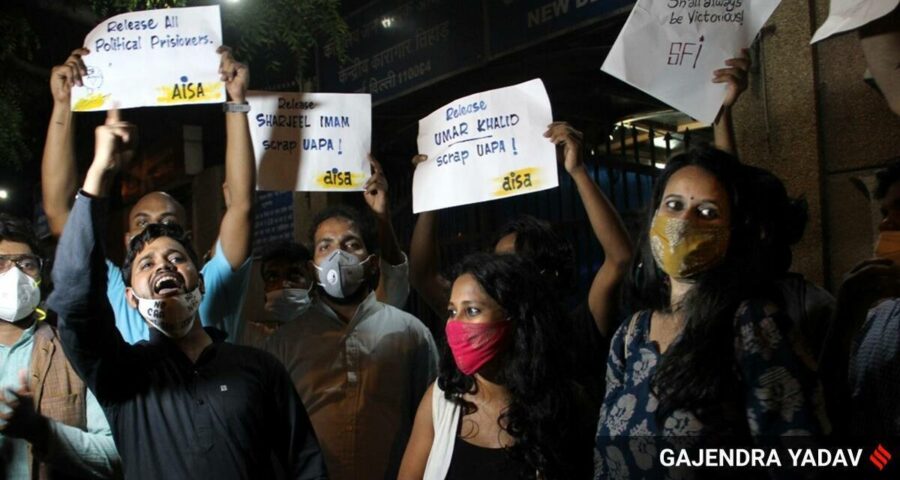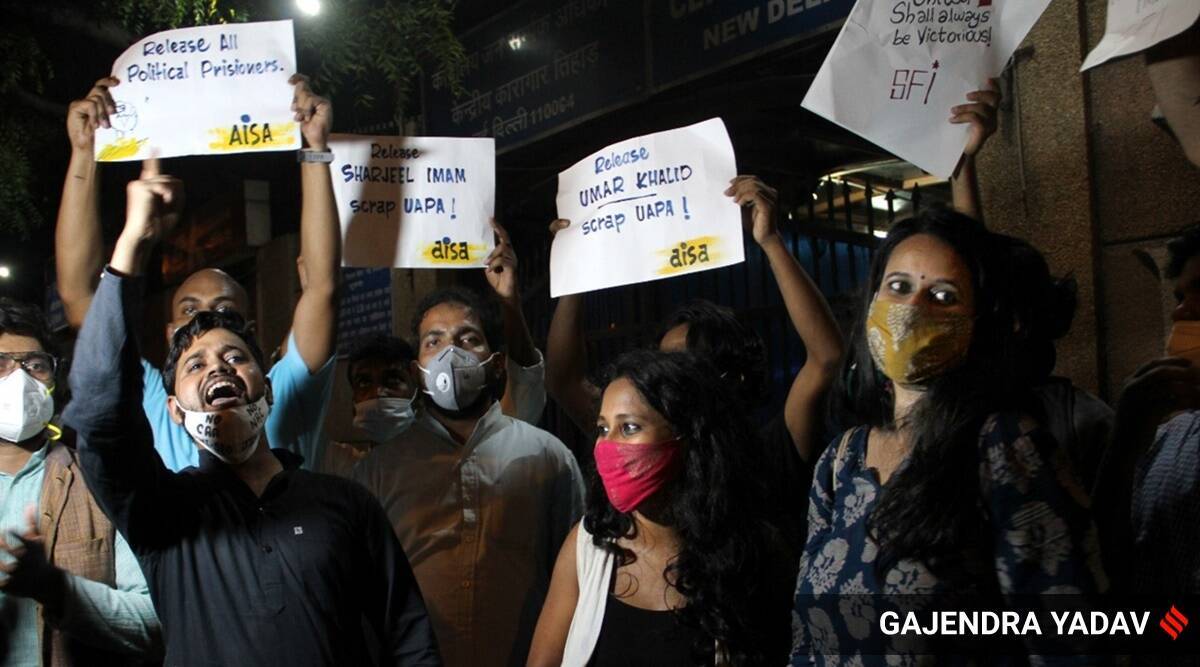The continued incarceration of undertrials must be premised on legal considerations and not political expediency
Written by Kartik Venu
The judgment in Asif Iqbal Tanha vs State of NCT Delhi is another addition to the growing series of examples of courts taking strong exception to the inability of the state to make out prima facie cases against riots accused while seeking to justify their arrests. While the judgments have been appealed by the state, the observations made therein are amply illustrative of the handling of the riots cases by the state in general and bear some consideration. The resort to “alarming and hyperbolic verbiage” in the chargesheet not based on factual allegations but inferences (as noted by the court in Tanha’s case) is par for the course across the chargesheets filed in most of the riots cases. These allege involvement in a grand conspiracy to incite or partake in the riots without ascribing a specific role of an accused.
Quoting the Supreme Court in A K Roy vs Union of India, the Court in Asif Iqbal Tanha emphasises that “the life and liberty of the person cannot be put on peril of an ambiguity”. Indeed, one of the cardinal principles in law is that all charges be put to an accused as precisely as possible for them to effectively meet the accusations. Yet the chargesheets filed in the riots cases carry common introductions with bold assertions that any and all acts of violence were not abrupt and spontaneous, but part of a “deep-rooted conspiracy hatched under the garb” of the anti-Citizenship Amendment Act protests in order to spread misinformation and stoke communal tensions. In this way, organisers of sit-in protests, locals frequenting the protests, and people indulging in rioting are all fair game to be prosecutable for the acts of others. While these types of arguments may be fashionable in TV debates, they make very little legal sense, premised on an excessively wide interpretation of constructive liability built into the offences of unlawful assembly and criminal conspiracy.
On the aspect of conspiracy, the Supreme Court held in PK Narayanan vs State of Kerala that “an offence of conspiracy cannot be deemed to have been established on mere suspicion and surmises or inferences which are not supported by cogent evidence”. In State (NCT of Delhi) v. Navjot Sandhu, the Court held that “a few bits here and a few bits there on which the prosecution relies cannot be held to be adequate for connecting the accused in the offence of criminal conspiracy”. Regrettably, the prosecution has routinely resorted to just that — premising allegations on loose inferences and not upon factual material. Take the example of Faizan Khan, a salesman at a mobile store, who was charged with committing a “terrorist act” under India’s anti-terror law, for his act of issuing and activating a mobile SIM card months before the riots and who stood accused of having acted in conspiracy with and as the alter-ego of Tanha. The court rightly found no proximate nexus between his act and the activities of the other accused, noting that the prosecution had not even established he had “actual knowledge” of the design to commit offences sought to be prosecuted in the FIR. In Khalid Saifi’s case, he was not even present at the scene of the offence he was accused of committing and ostensibly was arrested on the strength of the sheer invocation of conspiracy. The court found no substance whatsoever in the charge of conspiracy and went on further to express that the chargesheeting of Saifi on the basis of such insignificant material reflected “a total non-application of mind by the police” bordering on “vindictiveness”.
As regards unlawful assembly, many arrests are defended on the ground that the presence of an accused at the scene of the crime is sufficiently indicative of their participation in the unlawful assembly, therefore no further evidence is required. This is also a half-reading of the law. The mere presence of an accused in an unlawful assembly or mob does not per se make them a member of it unless it is established that they did or omitted to do something which would make him a member of that unlawful assembly. Being a curious bystander or onlooker, as held by the Supreme Court in Muthu Naicker vs. State of Tamil Nadu, should not lead to an interpretation of being part of a mob.
In other instances, residents implicated in one case are sought to be implicated in other cases concerning offences occurring in the vicinity. In Mehtab vs. State of NCT Delhi, the court noted that the accused was implicated in respect of an offence on account of his simply being sighted in a nearby area. Observing that a prior sighting in one area could not be used to implicate him in respect of an offence occurring subsequently in a different area, the court found no prima facie material against the accused in respect of the offence in question.
Undoubtedly, grant of bail does not amount to an exoneration of guilt. Having said that, if the inability to make out a prima facie case at all against an accused after completion of investigation is already being noted at the stage of bail, it stands to reason that many of these cases will be knocked out at the stage of discharge. Faizan had been incarcerated for almost three months; Saifi for almost nine months, and Mehtab for almost 10. In cases of this scale, where it is often said that the punishment is often the legal process itself, it remains an open question as to whether the innocent can be restituted for the months, sometimes years, lost to such cavalier approaches to their incarceration.
It should be remembered that irrespective of the fact that India follows an adversarial system of law, as emphasised in Manu Sharma, investigating agencies are still expected to conduct investigations impartially, and such investigations should not be indicative of a biased mind. The presumption of innocence of an accused is a fundamental canon of criminal jurisprudence. It is to be borne in mind not just by the courts but by the prosecution too, who must play a balanced role in the trial against an accused. While misuse of justice is not a new phenomenon, courts of law do well to continually remind us that continued incarceration of undertrials must be premised on legal considerations and not political expediency.
Source: Read Full Article


